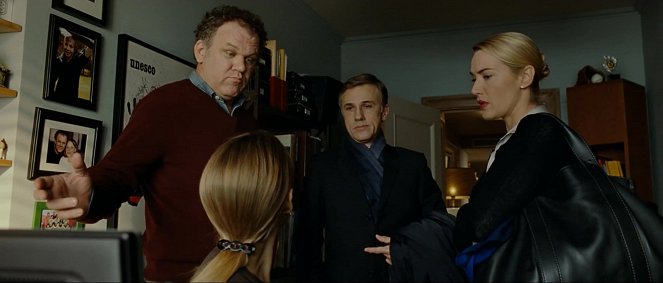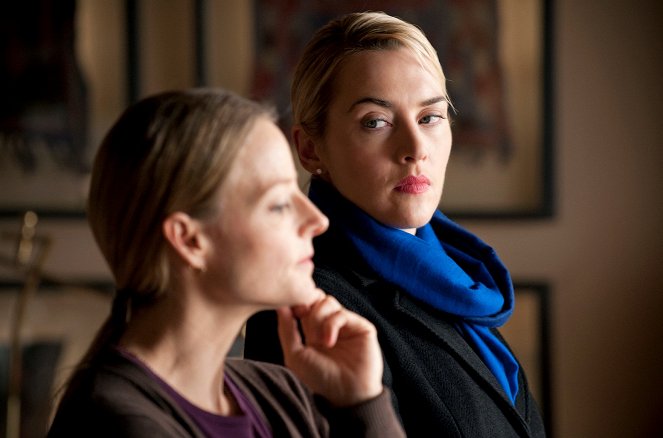Regie:
Roman PolańskiKamera:
Pawel EdelmanMusik:
Alexandre DesplatBesetzung:
Jodie Foster, Kate Winslet, Christoph Waltz, John C. Reilly, Elvis Polanski, Joseph Rezwin, Tanya Lopert, Julie AdamsStreaming (5)
Inhalte(1)
Für das Ehepaar Nancy und Alan Cowan ist der Vorfall äußerst peinlich. Ihr 11-jähriger Sohn hat bei einem Streit seinem Spielpartner zwei Zähne ausgeschlagen. Um sich dafür zu entschuldigen, statten die Cowans den Eltern des verletzten Kindes, Penelope und Michael, einen Besuch ab. Was zu Beginn wie ein versöhnliches Treffen vernünftiger Erwachsener wirkt, artet mehr und mehr in einen Krieg aller gegen alle aus. Ein Streit zwischen 11-Jährigen, wie er oft vorkommt. Zachary, der Sohn der Cowans, nimmt aus Wut einen Ast in die Hand und schlägt damit seinem Spielpartner Ethan zwei Zähne aus. Zacharys Eltern Nancy (Kate Winslet) und Alan (Christoph Waltz) besuchen die Eltern von Ethan in ihrer New Yorker Wohnung, um sich zu entschuldigen. Penelope (Jodie Foster) und ihr Mann Michael (John C. Reilly) zeigen sich zu Beginn sehr verständnisvoll, doch schon bald ergeben sich Unstimmigkeiten. Zu verschieden sind die Charaktere der Versammelten. Des Weiteren machen sich die Konflikte innerhalb der Ehepaare mehr und mehr bemerkbar. Michael vernachlässigt Penelope wegen seiner kranken Mutter, zudem erträgt die strenge Buchautorin kaum noch den oberflächlichen Lebensstil ihres Gatten. Auch zwischen dem arroganten Rechtsanwalt Alan und seiner bemüht freundlichen Frau Nancy kriselt es. Obwohl beide berufstätig sind, soll sich allein die Brokerin Nancy um die Erziehung von Zachary kümmern. Die Diskussion wird heftiger, die verbalen Attacken nehmen zu. Im Kampf aller gegen alle wird die Grenze zur Gewalttätigkeit immer schmaler. (ServusTV)
(mehr)Videos (13)
Kritiken (12)
Hautnah war ein verfilmtes Theaterstück, d. h. es fand eine Umwandlung in die Filmsprache statt. Der Gott des Gemetzels ist kein verfilmtes Theaterstück, es ist ein Theaterstück, das für die Leinwand aufgenommen und geschnitten wurde. Theaterschauspieler*innen können sich nicht auf die Mimik verlassen (welche die Zuschauer*innen von der Ferne nicht sehen), deshalb müssen sie übertreiben – die Körpersprache und eine erhöhte Stimme zur Hilfe ziehen. Der Gott des Gemetzels wandelte die Vorlage nicht in eine Filmsprache um, er nahm statisch eine Theaterschauspielerei auf (mit Gesichter-Details). Deshalb werfen ihm manche Zuschauer*innen vor, dass es sich um einen überflüssigen Film handelt. Für mich ist er aber aus zwei Gründen nicht überflüssig: 1. Wenn ich im Theater dieses Stück besuchen würde, wäre es bestimmt nicht mit diesen vier Super-Schauspieler*innen. 2. Wenn ich diese vier Super-Schauspieler*innen sehe und weiß, dass sie ihre Rollen bei Polański auch ohne ein Honorar darstellen würden, ist es für mich eine Zuschauer-Ehre.
()
Ein unkompliziertes, einfaches Konversationstheater auf der Leinwand. Und doch ausgezeichnet. Ein guter Text + vier selbstbewusste Schauspieler und Sie haben gewonnen. Das Kino brüllt während der gesamten Vorführung vor Lachen, denn wo sonst erkennen wir uns alle als in Stereotypen von Streitereien und Geschlechterkriegen wieder. Nicht perfekt, nicht überzeugend, voller schauspielerischer Manierismen, aber wirklich nett. Wo sonst kann man sehen, wie Kate Winslet sich über die gesamte Leinwand hinweg übergibt? Es geht um nichts Geringeres. Es ist nur schade, dass Julie Adams aus Der Schrecken vom Amazonas hier nur einen winzigen Auftritt hat.
()
Ich glaube, ich wäre begeistert, wenn ich nicht vor ein paar Monaten den Schauspielklub besucht und dieses tolle Dialogstück live gesehen hätte. Der Film wirkt daneben trocken, distanziert und wenig ausdrucksstark. Die Idee mit dem Telefonieren hat man im Schauspielklub toll hinbekommen, jedesmal rief dies eine Welle an Gelächter hervor, im Film störte das eher, trotzdem zeigt Christoph Waltz traditionell eine hervorragende Leistung. Einige Theaterstücke sollten eher nicht als Film verarbeitet werden, auch wenn dies von Regisseuren und Schauspielern mit klangvollen Namen übernommen wird.
()
Polanski et al. have the misfortune that I saw Carnage at the theatre. There, it made me almost die in laughter, at the cinema, however, I smirked amusingly here and there (mostly over Christoph Waltz’s smirks) and laughed (reminiscing the theatre play). It’s a good film, no doubt, with good performances and direction, but I can’t avoid being disappointed, even though I’m rationally aware that comparing a theatre play with a film is stupid. Though in this case is not that stupid actually, because you can really see the theatrical origin of the film… Some lines are clearly not uttered by a normal film character, but very “theatrically” by a character in a play.
()
“My Kokoschka!“ With films such as Repulsion, The Tenant and Death and the Maiden, Polanski demonstrated that he can build tension with just one room and a few actors to the point where we are ready for anything while having no idea what to expect. Carnage is made up of concise scenes, yet it continuously puts great effort into the absolute deconstruction of civilisation (which, together with the enclosed space, is reminiscent of the darker The Exterminating Angel). ___ The quartet of sufficiently different people who are, however, afflicted with the same social pretence gradually forget the basics of polite behaviour and even what social group they belong to. They lose their cool, inhibitions and even control over their own bodies, driven by concealed aggression and instinct (grunting laughter, automatic reactions to a ringing telephone). ___ In contrast to the original plan (a calm discussion in a setting decorated with tulips from Holland), the non-observance of which will most adversely affect Penelope, they begin to reveal their own transgressions and character flaws with devastating honesty. Their attachment to material things (mobile telephone, handbag, cigars, a bottle of Scotch, art books) is merely a triviality to get the ball rolling. ___ Their inability to face the unpleasantness which they would prefer to remove from their lives, like getting rid of a bothersome hamster, comes back to haunt them. We are not watching the failure only of individuals confusedly taking on different roles (man/woman, partner, parent) for a moment, but of an entire community. Only by gradually breaking down the civilisational walls that we build around ourselves is it possible to return from selfishly resolving personal problems to the suppressed collective (un)consciousness. Rejoining the clan that we left voluntarily and whose other members we only pretend to be interested in. The meeting, whose consequences are wisely concealed from us, could be beneficial for the participants at least as a means of returning them to their wild essence (indicated by the drums in the opening and closing background music) and the attendant self-discovery. ___ Behind the comedy, intensified with perfectly timed jokes to the point of inducing a nervous breakdown in everyone involved, there is a bitter, almost anthropological study of human dissatisfaction and the inability to overcome that dissatisfaction. (Their publicly revealed unhappiness derives “only” from honestly describing their current state.) For example, through the entirely banal acceptance of responsibility for parenting. Also, dealing with outside and, for example, even very remote problems (Darfur) doesn’t offer any redemption, but just another way to avoid the essence of the matter at hand. This is correctly pointed out by Alan, whose absolute indifference to the fleeting family-relationship bullshit enables him to have the most sober view of the whole farce (another thing is that his work may be even more fleeting as a result of that indifference). ___ Waltz’s precise gestures and intense emphasis on words with the potential to create conflict, complemented with the nonchalance with which he turns the Longstreets’ apartment into his workspace (or rather a café with a bar) make him the star of the proceedings in my opinion. With his “I don’t think anything” attitude, John C. Reilly is also excellent, as his Michael, an entirely simple man burdened with a mostly unresolved Oedipal complex, is the first to lose interest in pretending. However, the women do not stay in the background, as they are believably hysterical and, at the same time, above the men’s one-upmanship. ___ The mirror in the film serves to optically enlarge the space and, like the placement of the characters in the individual shots, informs us of the current distribution of belligerent forces, while the film itself is also a mirror. If you’re willing to look into it for a mere eighty minutes and think about what you’ve seen, perhaps it will, for starters, make you not brush off the question “How are you?” with the same answer as usual. Yeah, idealism. I’m healing. By observing people. Appendix: It occurred to me later that Carnage could also be understood as a politically incorrect response to The Descendants, a film that avoids the truth with such determination that if there were any sex in it, the people doing it would probably pray even when casting off the masks of civilisation (another one of Alan’s apt observations). 90%
()
(weniger)
(mehr)



Werbung